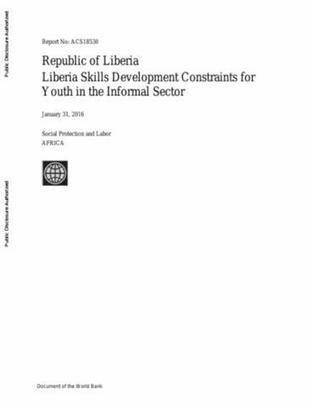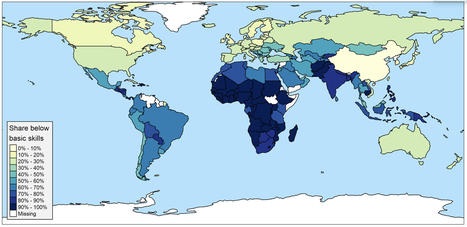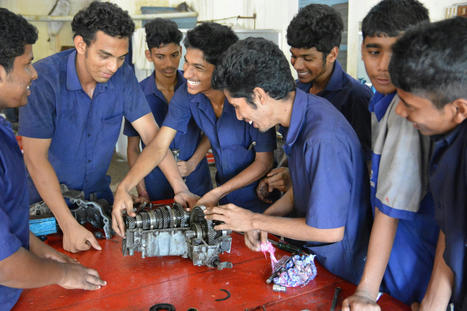 Your new post is loading...
 Your new post is loading...
Reform of formal technical and vocational education and training (TVET) is urgently needed in most low- and middle-income countries. Demographic trends, coupled with higher rates of students completing lower levels of education, can lead to an exponential increase in the number of secondary TVET students in the next 20 years, particularly in low-income countries (LICs). However, there are significant risks attached to expanding a system that is often considered a second-tier educational track and to which challenged learners are often directed. Because of a broken link between TVET systems and labor markets in low- and middle-income countries (LICs and MICs, together: L/MICs), TVET cannot deliver on its promise. The urgency is compounded by megatrends associated with globalization, technological progress, demographic transformation, and climate change, which affect both skills demand and the distribution of economic opportunities. This report offers guidance to policymakers designing and implementing TVET reforms, emphasizing core principles and practical considerations for L/MICs. There is much to be learned from recent L/MIC reform experiences like those in Bangladesh, El Salvador, and Mongolia, about identifying effective reform strategies and the likely impact of megatrends on future demand for TVET. The report focuses on secondary and post-secondary non-tertiary formal TVET, defined as TVET obtained within the formal education system that leads to diplomas, degrees, or other formal certifications. This overview, summarizing the main messages from the report, has three parts. The first, the TVET Promise, looks at the potential of TVET systems to deliver access to equitable, quality, and relevant training and contribute to employment and productivity. The second, the TVET Challenge, articulates the main limitations in practice for L/MIC TVET systems. The third, the Way Forward to Better TVET, proposes three interrelated transformations (three E’s) and six policy priorities to help TVET deliver on its promise in L/MICs.
Reform of formal technical and vocational education and training (TVET) is urgently needed in most low- and middle-income countries. Demographic trends, coupled with higher rates of students completing lower levels of education, can lead to an exponential increase in the number of secondary TVET students in the next 20 years, particularly in low-income countries (LICs). However, there are significant risks attached to expanding a system that is often considered a second-tier educational track and to which challenged learners are often directed. Because of a broken link between TVET systems and labor markets in low- and middle-income countries (LICs and MICs, together: L/MICs), TVET cannot deliver on its promise. The urgency is compounded by megatrends associated with globalization, technological progress, demographic transformation, and climate change, which affect both skills demand and the distribution of economic opportunities. This report offers guidance to policymakers designing and implementing TVET reforms, emphasizing core principles and practical considerations for L/MICs. There is much to be learned from recent L/MIC reform experiences like those in Bangladesh, El Salvador, and Mongolia, about identifying effective reform strategies and the likely impact of megatrends on future demand for TVET. The report focuses on secondary and post-secondary non-tertiary formal TVET, defined as TVET obtained within the formal education system that leads to diplomas, degrees, or other formal certifications. This overview, summarizing the main messages from the report, has three parts. The first, the TVET Promise, looks at the potential of TVET systems to deliver access to equitable, quality, and relevant training and contribute to employment and productivity. The second, the TVET Challenge, articulates the main limitations in practice for L/MIC TVET systems. The third, the Way Forward to Better TVET, proposes three interrelated transformations (three E’s) and six policy priorities to help TVET deliver on its promise in L/MICs.
Vocationally oriented training programs are a way forward for developing countries looking to fill employment gaps in various professions without investing much in infrastructure development or promoting higher wage sectors. The future looks bright for vocational education and training as students worldwide are adopting this trend knowingly or unknowingly according to their economic needs.
Employers often need help finding skilled employees. Many developing countries need more qualified professionals. These nations often need to match the degrees required to become a professional and the candidates available. As a result, they cannot create jobs for their citizens and grow their economies.
The results indicate that, from a purely technological feasibility viewpoint, advanced countries are more vulnerable than developing countries on average. Male and middle-aged workers are also likely to be more affected by automation, whereas high-skilled workers are likely to be the least affected by automation. The results also indicate that automation could reduce gender inequality not only through jobs but also through wages.
There can be no sustainable national development without vocational and technical education, and there can be no vocational and technical education without skills acquisition. The issue of sustainable national development is not a one-day event, but constant or continuous process that affects the citizens positively. The paper x-rayed the peculiar characteristics of vocational and technical education in providing necessary skills to the populace for sustainable national development. The conceptual clarification of vocational education, technical education, vocational and technical education, and sustainable national development were considered. The paper further discussed a brief history of vocational and technical education in Nigeria, during the pre-colonial, colonial and the post-colonial era. The paper examines the importance of vocational and technical education in Nigeria development. It further highlighted the role of vocational and technical education in sustainable national development. The paper concluded that non-acquisition of saleable skills has been a major factor in the countries under development and high rates of poverty and other social vices. Therefore, VTE as the type of education with these values should be recognized and taken serious for sustainable national development to strive.
The types of workers recruited into teaching and their allocation across classrooms can greatly influence a country’s stock of human capital. This paper considers how markets and non-market institutions determine the quantity, wages, skills, and spatial distribution of teachers in developing countries. Schools are a major source of employment in developing countries, particularly for women and professionals. Teacher compensation is also a large share of public budgets. Teacher labor markets in developing countries are likely to grow further as teacher quality becomes a greater focus of education policy, including under the United Nations Sustainable Development Goals. Theoretical approaches to teacher labor markets have emphasized the role of non-market institutions, such as government and unions, and other frictions in teacher employment and wages. The evidence supports the existence and importance of such frictions in how teacher labor markets function. In many countries, large gaps in pay and quality exist between teachers and other professionals; teachers in public and private schools; teachers on permanent and temporary contracts; and teachers in urban and rural areas. Teacher supply increases with wages, though teacher quality does not necessarily increase. However, most evidence comes from studies of short-term effects among existing teachers. Evidence on effects in the long-term, on the supply of new teachers, or on changes in non-pecuniary compensation is scarcer.
We know that young people are essential to economic development and growth. They make up approximately one-third of the working-age population in the average emerging market and developing economy.
The findings illustrate the importance of early human capital
investments on educational attainment, but also point to the prevalence of short-term restrictions that disproportionately affect females in disadvantaged households.
Who are the youth and what is the problem? Are entrepreneurship and self-employment the solution? And what about youth aspirations? Such questions are addressed in this issue of the IDS Bulletin, drawing from the literature on how development research affects policy and noting that it says little about how young researchers move into policy engagement.
The labor force in Liberia is quite young. Youth aged 15 to 34 constitute over a third of the population in Liberia and are somewhat concentrated in urban areas. These youth represent both a demographic dividend and a concern. The educational attainment of Liberian youth is steadily improving but remains low on average.Youth recognize that their lack of skills and experience are impediments to employment.The objective of this report is to assess youth skills development in Liberia.Given the composition of Liberia’s economy and the concentration of the labor force outside formal employment, this report has a particular focus on skill development in vocational trades and the informal sector.
In Somalia, decades of conflict and natural calamities have frustrated the normal coping strategies of its otherwise resilient population. To mitigate the impact of recurrent shocks to Somali livelihoods, the ICRC helps vulnerable groups start small businesses by offering vocational training to improve their skills, and then providing them with the capital investment or tools they need to start the business. This video shows examples of such programmes – training of young men as mechanics, carpenters and electricians and women as tailors.
|
The report brings together global knowledge on Technical Vocational and Education Training (TVET) reform to develop a common understanding on the promise of TVET in advancing employment and productivity. This is important in support of sustainable economic transformations and in light of challenges observed in TVET systems in low- and middle-income countries. The report also looks at lessons learned from TVET reforms, including from the COVID-19 pandemic, and offers a way forward toward more impactful and coordinated support of TVET systems in the future.
Ensuring that all children in the world obtain at least basic skills is paramount for world development. This column combines multiple data sources from international tests to conduct a cross-country analysis of basic skills using a common achievement scale. It shows that the world is incredibly short of meeting the Sustainable Development Goal of universal quality education, as at least two thirds of the world’s youth do not even reach basic skill levels. This suggests a huge untapped source of global economic growth.
In 2021, about 220 million students globally were enrolled in formal post-secondary education, more than doubling the enrollment figure from 2000.
In developing countries, we are seeing a massive growth in demand for higher education as more students than ever are moving through the education pipeline—from primary to secondary and on to tertiary.
Although many developing countries have committed resources to TVET and have made substantial progress, challenges still remain in most of the TVET systems.
The report sheds light on changing demand for skills in digital economies and societies, based mostly on a literature review, supported by a set of case studies from low- and middle-income countries. It reviews different approaches to measuring digital skills, and discusses the impact of digitalization on skills and related policy recommendations. It shows that, while digitalization may vary widely in its extent and forms across countries and sectors, its impact on jobs and skills is nevertheless considerable everywhere.
The report contributes to a better understanding of the key skills implications of the digitalization process and helps to address the fundamental challenge of how skills and lifelong learning systems should respond to the rapid pace of technological and structural change brought about by digitalization.
Why is it so difficult for young people in Bangladesh to make the transition from school to professional life? Often, they lack the appropriate professional qualifications. The “Uttoron” project developed a unique, three-stage trainee selection process, the so-called “boot camp”. Giaul Islam, Shiuli Akhter, and Al-Imran recount the positive ways in which the boot camp helped them to start their professional lives.
Sabemos que los jóvenes son imprescindibles para el desarrollo y el crecimiento económico, y que en una economía de mercado emergente y en desarrollo típica, los jóvenes representan aproximadamente un tercio de la población en edad laboral.
MOOCs pose significant challenges to participants from developing countries and might in fact further aggravate existing educational divides as the education world might increasingly be separated into tiers: those who have access to quality education and MOOCs and those who do not or cannot have access.
it is useful to distinguish three different ways through which digital technology affects the world of work: automation, connectivity, and innovation. They change the cost of labor versus capital, the cost of transacting, the potential for economies of scale and market competition, and the speed of innovation. Together this will determine how and where goods are produced and services provided and thus what the world of work will look like, in developed and developing countries alike.
This paper discusses a randomized control trial to measure the short-term impacts of a skills intervention among urban youth in Sierra Leone at the onset of the Ebola crisis. The intervention provided (i) technical skills training, plus on-the-job training; (ii) business skills training; and (iii) a mix of (i) and (ii). All groups received stipends and literacy and numeracy training. The findings support evidence that combining cash injections and skills training can stimulate employment and entrepreneurship. The program boosted household consumption and investments in housing and assets, thereby building resilience to the Ebola shock.
|
 Your new post is loading...
Your new post is loading...
 Your new post is loading...
Your new post is loading...
























